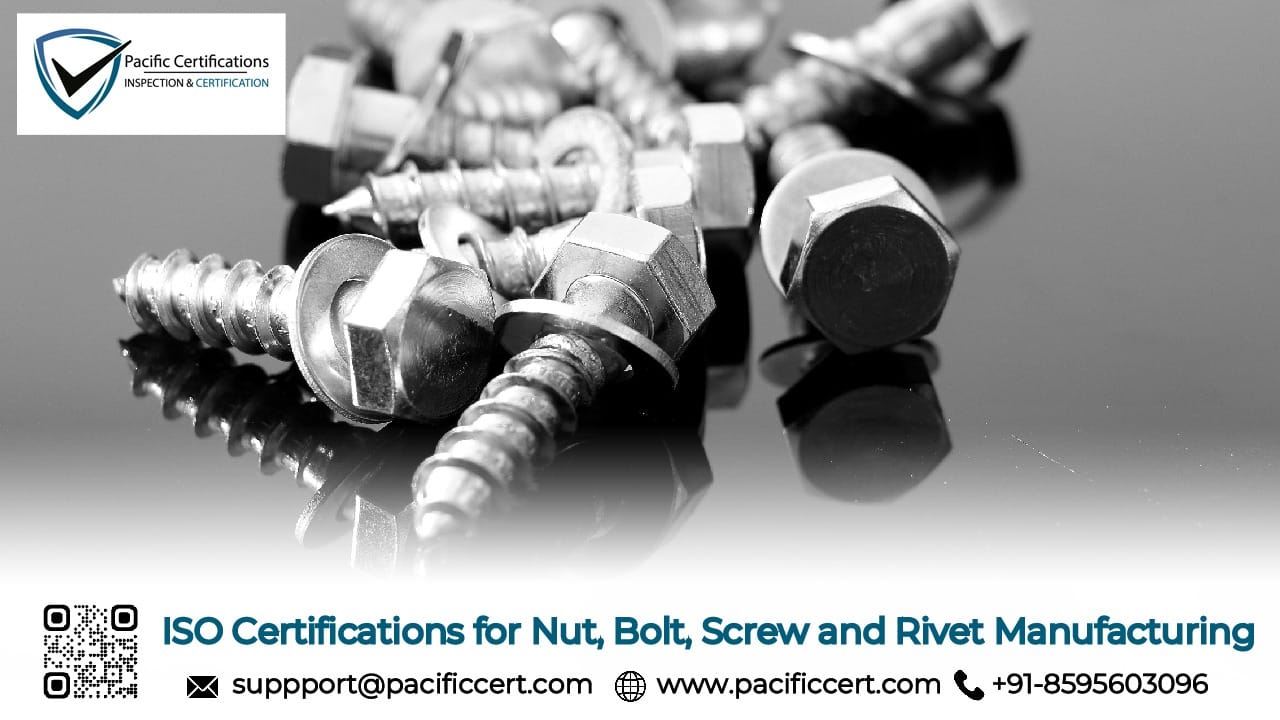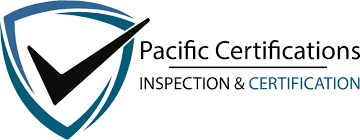ISO Certifications for Nut, Bolt, Screw and Rivet Manufacturing Requirements and Benefits

Introduction
Manufacturers in the nut, bolt, screw, and rivet sector operate within demanding environments marked by high-precision forging, heat treatment, and coating processes that demand unwavering material integrity. These businesses routinely handle cold heading for screw formation, thread rolling for bolt accuracy, and zinc plating to prevent corrosion, all while navigating volatile raw material prices and intense global competition from low-cost imports. Even minor defects like shank diameter deviations or hydrogen embrittlement in high-strength fasteners can trigger catastrophic failures in downstream applications such as automotive assemblies or structural frameworks, amplifying operational risks from machinery malfunctions to supply chain disruptions.
Global compliance frameworks push these manufacturers toward rigorous standards, as buyers in construction, aerospace, and machinery sectors increasingly mandate verifiable quality and traceability. ISO certifications emerge as essential tools, embedding systematic quality controls, risk assessments, and process optimizations that align with international regulatory expectations. They fortify defenses against product liability claims tied to fastener failures, while enhancing eligibility for premium contracts in regulated markets.
Every bolt holds more than two parts together — it holds your brand’s reputation for strength and precision. — Pacific Certifications
Quick Summary
ISO certifications like ISO 9001, ISO 14001, ISO 45001 , ISO 50001 etc, help nut, bolt, screw, and rivet manufacturers ensure consistent quality, safety, and compliance. These standards improve product precision, worker safety, energy efficiency, and testing accuracy, while enhancing global market acceptance and OEM trust. Certified manufacturers achieve fewer defects, lower costs, and stronger credibility, positioning themselves for sustainable growth and export competitiveness in the fastener industry.
For more information on how we can assist your nut, bolt, screw, and rivet manufacturing business with ISO certifications, contact us at [email protected].
Applicable ISO Standards for Nut , Bolt, Screw, and Rivet Manufacturing Businesses
ISO standards cater to various aspects of manufacturing, from quality control to environmental management. Here are the key ISO certifications applicable to the nut and rivet manufacturing sector:
ISO 9001: Quality Management Systems (QMS)
Fastener producers rely on ISO 9001 to standardize thread rolling and coating inspections, ensuring shank diameters and grip lengths meet global specs. It drives continuous improvement, slashing rework on screws by rigorous internal audits. Compliance opens doors to diverse markets beyond automotive.
ISO 14001: Environmental Management Systems (EMS)
Fastener operations generate plating sludge and heat treatment emissions, which ISO 14001 curbs via waste segregation and water recycling systems. Manufacturers monitor zinc flake coating impacts, achieving regulatory alignment. Sustainable practices enhance appeal to eco-conscious buyers.
ISO 45001: Occupational Health and Safety Management Systems
In plants handling heavy presses and plating baths, ISO 45001 identifies hazards like pinch points and chemical fumes, implementing lockout-tagout protocols. Workers benefit from tailored training on repetitive strain prevention during nut forming. This reduces incidents, stabilizing production uptime.
ISO 898: Mechanical Properties of Fasteners
This technical standard defines the mechanical properties of fasteners, including bolts, screws, and nuts. Compliance with ISO 898 guarantees that products meet performance and safety criteria.
ISO 10683: Non-Electrolytically Applied Zinc Flake Coatings
Corrosion resistance is crucial for fasteners. ISO 10683 specifies requirements for non-electrolytic zinc flake coatings, ensuring durability in challenging environments.
ISO 4042: Electroplated Coatings on Fasteners
This standard applies to electroplated coatings, ensuring adherence to specifications for thickness, adhesion, and corrosion resistance.
ISO 8992: General Requirements for Fasteners
ISO 8992 defines the general requirements for fasteners, including design, manufacturing tolerances, and testing protocols.
Inspection and testing ensure the quality of fasteners. ISO 3269 specifies guidelines for sampling, testing, and acceptance criteria for these products.
Click here to find out more applicable standards to your industry
What are the requirements of ISO Certifications for Nut, Bolt, Screw and Rivet Manufacturing?
Understanding the specific requirements of each applicable ISO standard is crucial for compliance and successful certification. Below is a breakdown of the requirements:
Generic Requirements (Applicable Across All Standards):
Policy & Objectives: Define quality, safety, and environmental policies aligned with company goals.
Risk Assessment: Identify risks in production, raw material sourcing, equipment failure, and workforce safety.
Process Documentation: Maintain documented procedures for machining, threading, plating, inspection, and packaging.
Training & Competence: Train workers on machine operation, inspection, safety, and quality requirements.
Equipment Calibration: Calibrate torque testers, micrometers, gauges, and hardness testers as per ISO 17025.
Internal Audits: Conduct regular audits to verify process compliance and identify improvement areas.
Management Review: Top management must review quality performance, nonconformities, and corrective actions.
Corrective & Preventive Actions: Eliminate root causes of defects or process deviations.
Legal & Regulatory Compliance: Comply with local manufacturing, safety, and environmental laws.
Continuous Improvement: Use data analysis, customer feedback, and KPIs to enhance performance and reduce waste.
ISO 9001: Quality Management Systems (QMS) requirements
Quality Policy and Objectives: Develop and document clear quality policies aligned with business goals.
Process Approach: Identify and manage key processes that influence product quality.
Risk Management: Conduct risk-based thinking to mitigate potential failures.
Customer Focus: Establish processes to understand and fulfill customer needs.
Internal Audits: Perform regular audits to evaluate the effectiveness of the quality management system.
Corrective Actions: Implement actions to address non-conformities and prevent recurrence.
Continuous Improvement: Use data-driven decisions to enhance processes and performance.
ISO 14001: Environmental Management Systems (EMS) requirements
Environmental Policy: Develop a policy that reflects the organization's commitment to sustainability.
Environmental Aspects: Identify activities that impact the environment, such as energy use, emissions, and waste.
Compliance Obligations: Adhere to applicable environmental laws and regulations.
Objectives and Targets: Set measurable goals to improve environmental performance.
Monitoring and Measurement: Track environmental performance metrics, including waste reduction and resource efficiency.
Emergency Preparedness: Develop plans for handling environmental incidents.
ISO 45001: Occupational Health and Safety Management
Hazard Identification: Conduct risk assessments to identify workplace hazards.
Legal Compliance: Ensure adherence to occupational safety and health regulations.
Worker Participation: Engage employees in safety initiatives and decision-making.
Training and Awareness: Provide safety training and ensure employees are aware of risks and controls.
Incident Investigation: Establish processes to report, investigate, and address workplace incidents.
Emergency Response: Prepare and test emergency response procedures.
ISO 898: Mechanical Properties of Fasteners requirements
Material Specifications: Use materials that meet specified mechanical properties.
Hardness Testing: Conduct tests to ensure fasteners meet tensile and yield strength requirements.
Dimensional Accuracy: Adhere to dimensional tolerances for fasteners.
Marking: Clearly mark fasteners with grade and identification information.
ISO 10683: Non-Electrolytically Applied Zinc Flake Coatings requirements
Coating Thickness: Maintain specified coating thickness to ensure durability.
Adhesion Testing: Test for proper adhesion of coatings to fastener surfaces.
Corrosion Resistance: Conduct salt-spray tests to verify resistance to environmental factors.
ISO 4042: Electroplated Coatings on Fasteners requirements
Coating Uniformity: Ensure consistent plating across all surfaces.
Hydrogen Embrittlement: Perform baking treatments to minimize embrittlement risks.
Corrosion Protection: Meet standards for corrosion resistance through testing.
Tip: Standardize installation and maintenance checklists under your ISO system — it reduces on-site errors and improves client satisfaction.
Contact us at [email protected] for expert support!
What are the benefits of ISO Certifications for Nut, Bolt, Screw and Rivet Manufacturing?
Nut, bolt, screw, and rivet manufacturers gain strong operational and commercial advantages from ISO certifications, including enhanced compliance and market access. Listed below are the key benefits for the ISO standards applicable to precision producers, automotive suppliers, and machinery fabricators:
Improved product reliability through standardized tensile testing reduces fastener failures in high-stress automotive joints.
Stronger supplier relationships as OEMs prefer certified producers for zero-defect screw deliveries.
Reduced scrap rates from precise heat treatment controls, lowering costs in bolt production by 20-30%.
Enhanced worker safety via hazard assessments on plating lines, cutting incidents in nut forming areas.
Better environmental compliance with waste management from zinc coating, appealing to global buyers.
Higher export eligibility since accredited testing labs validate rivet strength for international standards.
Streamlined audits proving process controls for thread accuracy, speeding contract approvals.
Greater energy efficiency in annealing furnaces, reducing operational costs amid rising raw material prices.
The global industrial fasteners market, encompassing nuts, bolts, screws, and rivets, reached approximately USD 109 billion in 2025 and projects steady expansion at a CAGR of around 4.3% in the coming years, driven by surging infrastructure builds and automotive electrification. Emerging economies fuel much of this growth through massive construction and machinery projects, while developed markets emphasize high-strength fasteners for aerospace and renewables. International regulatory trends increasingly mandate lifecycle assessments and material traceability, pushing manufacturers toward integrated management systems amid stricter emissions controls.
Certified facilities report 20-30% drops in defect-related recalls and energy use, bolstering resilience against supply disruptions like steel shortages. Over the next decade, aging infrastructure upgrades and electric vehicle booms will amplify demand for precision rivets, alongside digital twins for process simulation. Safety incidents from subpar coatings have spotlighted ISO adoption, with technology integrations like AI defect detection accelerating compliance in high-volume plants.
How Pacific Certifications Can Help
Pacific Certifications is accredited by ABIS, conducts independent audit and certification services for fastener manufacturers under all relevant ISO standards. We do not provide consultancy but ensure impartial, accredited certification recognized worldwide.
Pacific Certifications can help by:
Conducting audits for ISO 9001, 14001, 45001, 50001 etc.
Issuing internationally accepted ISO certificates for suppliers and OEM partners.
Supporting integrated management system audits for multi-plant operations.
Contact us
If you need support with ISO certification for your Nut, Bolt, Screw and Rivet Manufacturing business, please contact us at [email protected] or +91-8595603096.
Ready to get ISO certified?
Contact Pacific Certifications to begin your certification journey today!
Author: Sony
Suggested Certifications:
Read more: Pacific Blogs

